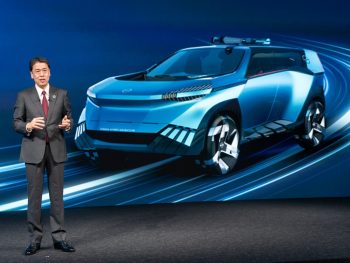Nissan to slash EV costs and achieve ICE parity by 2030 under new plans
Nissan has set out plans to launch new models, advance electrification and achieve significant next-generation EV cost reduction under its revised strategy.

Nissan will work to reduce the cost of next-generation EVs by 30% and achieve EV and ICE vehicle cost parity by fiscal year 2030
Dubbed The Arc, the two-pronged plan will initially focus on actions to ensure volume growth through a tailored regional strategy and prepare for an accelerated transition to EVs, supported by a balanced electrified/ICE product portfolio, volume growth in major markets and financial discipline. This will pave the way for the second part of the plan aimed to enable the EV transition and realise long-term profitable growth, supported by smart partnerships, enhanced EV competitiveness, differentiated innovations and new revenue streams.
The plan includes a major broad-based product offensive that will see 30 new models to be launched by fiscal year 2026, of which 16 will be electrified and 14 will be ICE models, catering for diversified customer needs.
The regionalised plans include a target in Europe to launch six all-new models and achieve 40% EV passenger-vehicle sales mix.
Globally, Nissan plans to launch a total of 34 electrified models from fiscal year 2024 and 2030 to cover all segments, with the model mix of electrified vehicles expected to account for 40% globally by fiscal year 2026 and rise to 60% by the end of the decade.
New development and manufacturing approaches will make EVs more affordable and increase profitability. As with other carmakers such as Kia, Nissan will develop EVs in families, integrating powertrains, utilising next-generation modular manufacturing, group sourcing, and battery innovations. This aims to reduce the cost of next-generation EVs by 30% (when compared to the current model Ariya crossover) and achieve cost-parity between EVs and ICE models by fiscal year 2030.
By grouping development in families, the Japanese brand says the cost of subsequent vehicles – based on the main vehicle in the family – can halved, while the variation of trim parts reduced by 70% and development lead time shortened by four months. Vehicle production under the approach will start in 2027.
Nissan will also offer enhanced nickel manganese cobalt (NCM) li-ion, LFP and all solid-state batteries to provide diversified EVs to meet different customer needs. Its NCM li-ion batteries will be overhauled to halve quick-charging time and increase energy density by 50% compared to the Ariya. LFP batteries, to be developed and produced in Japan, will be launched that will reduce cost by 30% compared to the Sakura electric kei car. New EVs with enhanced NCM li-ion, LFP and all-solid-state batteries will be launched in fiscal year 2028.
Other focuses include the expansion of strategic partnerships into technology, product portfolio and software services.
Nissan president and chief executive officer Makoto Uchida said: “The Arc plan shows our path to the future. It illustrates our continuous progression and ability to navigate changing market conditions. This plan will enable us to go further and faster in driving value and competitiveness. Faced with extreme market volatility, Nissan is taking decisive actions guided by the new plan to ensure sustainable growth and profitability.”

